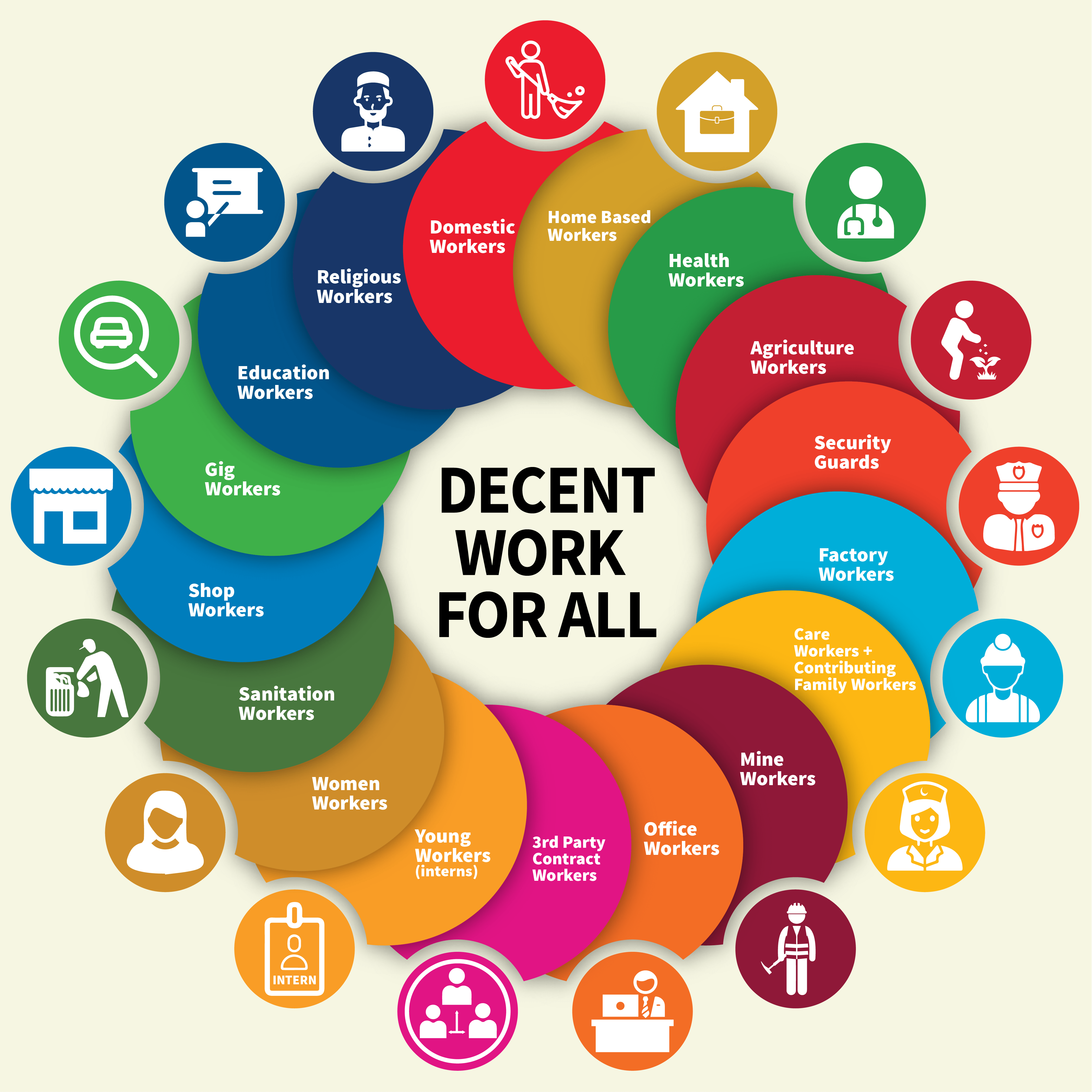Online Work Principles
Principle 1:
Fair Pay
Workers must have full confidence that they will be paid for the work they do. Workers can sometimes face the risk of a client not paying for work that has been completed. To achieve this point platforms must guarantee that this is not possible. Where a client considers that work is not completed satisfactorily, there must be a clear and reasonable process for rejection decisions. Additionally, timeliness and regularity of payment are crucial to evidencing fair pay.
The platform must satisfy all of the following:
- There is a mechanism to ensure workers are paid.
- Non-payment for completed work is not an option for clients.[1]
- Payments are made within an agreed timeframe.
- Workers can choose to be paid in a recognised national currency.
- Workers can request funds from their account on a regular basis with reasonable withdrawal thresholds.
The rate of pay must meet the minimum legal threshold in the place where the worker works, regardless of whether the worker earns an hourly wage, or engages in piece-rate work.
The platform must satisfy either 1) or 2) depending on their payment model:
- For hourly-paid work, workers earn at least their local minimum wage.
- For piece-rate work, the vast majority of workers earn at least their local minimum wage.[2]
Principle 2:
Fair Conditions
Health and safety risks to workers can include amongst other things exposure to psychologically harmful material, and breaches of data privacy and security. To achieve this point the platform must demonstrate policies and processes that minimise risks to workers.
The platform must satisfy all of the following:
- There are policies to protect workers from risks that arise from the processes of work.
- There are processes for job-related health and safety risks (including psychological risks) to be identified and addressed.
- Risks related to a specific job are flagged to workers before they accept the job (such as indicating that they might be exposed to violent content).
- There are clear reporting channels and documented penalties for clients who disregard or jeopardise workers’ health and safety.
- There are adequate and ethical data privacy and security measures, laid out in a documented policy.[3]
Workers may spend a significant amount of their working day applying for jobs, especially if they are competing with a lot of other workers. This can include sending credentials to prospective clients, or developing pitches. This constitutes working time, but it is time that the worker is not being paid for. In order to reduce this unpaid working time, platforms should ensure that jobs are available to workers on the platform, and there is not an unmitigated oversupply of labour, meaning more workers are competing for the same job.
The platform must satisfy BOTH of the following:
- The number of workers is managed to mitigate oversupply.
- The allocation of work is managed to promote job availability, and reduce unpaid work and overwork.[4]
Principle 3:
Fair Contracts
The terms and conditions governing platform work are not always clear and accessible to workers. To achieve this point the platform must demonstrate that workers are able to understand, agree to, and access the conditions of their work, and that they have legal recourse if the platform breaches those conditions.
The platform must satisfy all of the following:
- The contract is written in clear and comprehensible language that the worker could be expected to understand.
- The contract is available for workers to access at all times.
- Workers are notified of proposed changes in a reasonable timeframe before changes come into effect.
- Changes should not reverse existing accrued benefits and reasonable expectations on which workers have relied.
- The contract does not require workers to waive rights to reasonable legal recourse against the platform.
Platforms mediate the contact and the transaction between workers and clients. Therefore they have a responsibility for oversight of the relationship between workers and clients, and to protect workers’ interests. This also includes a duty of care in ensuring that direct contracts raised between clients and workers do not unfairly disadvantage the worker or reduce the worker’s labour market prospects. Additionally, where workers are self-employed, contracts should allow for freedom to choose their own working schedules, and the jobs they accept or refuse on the platform.
The platform must satisfy all of the following:
- There are guidelines to ensure that any contract raised between workers and clients directly in relation to work mediated by the platform (such as non-disclosure agreements) are fair and equitable for the worker.
- Clients are required to make a good faith effort to inform the worker about the purpose of the job.
- The worker is not subject to non-compete clauses.
Except in cases where the worker is in a standard employment relationship:
- The platform makes clear that working schedules cannot be imposed upon workers.[5]
- The worker retains the freedom to choose which tasks to accept or refuse.
- The refusal of offered tasks by workers does not punitively impact a workers’ rating, reputation, or the worker’s ability to access future work on the platform.
Principle 4:
Fair Management
Platform workers can experience deactivation; being barred from accessing the platform, sometimes without due process, and losing their income. Workers may be subject to other penalties or disciplinary decisions without the ability to contact the platform to challenge or appeal them if they believe they are unfair. To achieve this point, platforms must demonstrate an ability for workers to meaningfully appeal disciplinary actions.
The platform must satisfy all of the following:
- There is a channel for workers to communicate with a human representative of the platform. This channel is documented in the contract and available on the platform interface.
- There is a process for workers to meaningfully appeal low ratings, non-payment, deactivations, and other penalties and disciplinary actions. This process is documented in the contract and available on the platform interface.
- In the case of deactivations, the appeals process must be available to workers who no longer have access to the platform.
The majority of platforms do not actively discriminate against particular groups of workers. However, they may inadvertently exacerbate already existing inequalities through their design and management. To achieve this point, platforms must show that they have policies against discrimination that can occur between different user groups, and that workers are assured that they will not be disadvantaged through management processes.
The platform must satisfy all of the following:
- There is a policy which guarantees that the platform will not discriminate against persons on the grounds of racial, ethnic, social or minority background, caste, religion or belief, political or any other opinion, language, gender, gender identity, sex, sexual orientation, disability, age, or any other status.
- There are mechanisms to reduce the risk of users discriminating against workers on any basis listed above.
- The platform specifies the methods used to manage and allocate work (including when algorithms are used).
Principle 5:
Fair Representation
To observe workers’ right to fair representation, platforms must ensure that workers have information about their options for representation in a dispute, as well as ensuring they have access to an independent advocate. Platforms must also guarantee that workers have freedom of association, as enshrined in the constitution of the International Labour Organisation and the Universal Declaration of Human Rights.
The platform must satisfy all of the following:
- The platform makes information available to workers about all their options for legal representation.
- The platform commits to a process of dispute resolution in which workers have access to an independent advocate who is freely chosen by the worker, or by an independent workers’ body.[6]
- Freedom of association is not inhibited and groups of workers are not disadvantaged in any way for communicating their concerns, demands and wishes to management.
The ability for workers to organise and collectively express their voice is an important prerequisite for fair working conditions. Workers must be able to assert their demands through a representational body which is free from any influence by platform management. Where such a body does not exist, it is incumbent on platforms to ensure workers’ voices can be represented by encouraging its formation.
The platform must satisfy either 1), 2), or 3):
- It is democratically governed by workers.
- It publicly and formally recognises an independent collective body of workers, an elected works council or trade union, and has not refused to participate in collective representation or bargaining. New workers are advised of the existence of this body, and of how to join.
- If such a body does not exist, it formally communicates to workers its willingness to recognise, or bargain with, a representative body of workers or trade union.[7]
PLATFORM: Here, the term ‘platform’ is used to refer to a ‘cloudwork platform’ (Woodcock and Graham 2020). Cloudwork platforms are one of two broad types of ‘digital labour platforms’. There are two points of note here. First, a ‘digital labour platform’ is a company that uses digital resources to mediate value-creating interactions between consumers and individual service-providing workers, i.e. that digitally mediates transactions of labour. Digital platforms like Airbnb or eBay—where goods are exchanged—are not included within this definition. Second, among digital labour platforms, there are two broad types. In the first—’geographically-tethered’ or ‘location-based’ platforms—the work is required to be done in a particular location (e.g. delivering food from a restaurant to an apartment or driving a person from one part of town to another). In contrast, in the second—’cloudwork’ platforms—the work can, in theory, be performed from anywhere via the internet (e.g. data categorisation or online freelancing). In these principles, the term ‘platform’ refers only to the second category of cloudwork platforms.
WORKER: People who find work through platforms, regardless of their employment status (e.g. employees or independent contractors).
CONTRACTS: All written agreements between parties about the terms of the work including terms and conditions. These may be signed in-person or electronically.
Footnotes
In cases where rejection mechanisms exist for delivered work:
- Workers should be able to contest rejection decisions.
- Workers receive a clear and reasonable explanation for any rejections
- Workers may attempt to redo rejected work at least once
- If the worker contests the rejection decision, the case is reviewed (a second time) by a neutral third party, who makes a binding decision; the platform agrees not to punish the worker in any way if the third party decides in favour of the worker.
- If the work is rejected it is not able to be used by the client.
- Number of tasks of a given kind completed by workers on average per hour = A
- This number is divided by 1.2 to calculate A*, an estimated average number of tasks completed per hour that accounts for the disadvantage that relatively inexperienced workers face.
- Therefore, A* = 0.83A
- Local minimum hourly wage = M,
- This figure varies across jurisdictions.
- Where a jurisdiction’s laws do not specify a minimum wage, a reasonable alternative can be used.
- Fair piece rate corresponding to the minimum wage = F = (M ÷ 0.83A).
This calculation must be repeated across task types. To receive this point, platforms operating on a piece-work model must demonstrate that 85% or more of workers on their platform earn more than F per hour in each task type.


